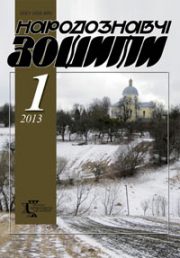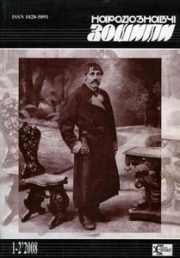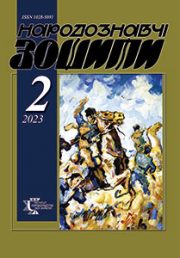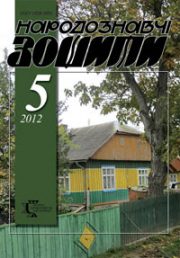The Ethnology Notebooks. 2019, № 3 (147), 670—683
UDK 398.41(477.82)
DOI https://doi.org/10.15407/nz2019.03.670
KRYVENKO Anastasiia
ORCID ID: https://orcid.org/0000-0001-9353-2919
Candidate of Sciences in History, Researcher
of the Institute of Ethnology of the National Academy
of Sciences of Ukraine,
in the department of Modern Ethnology
15, Svobody Avenue, 79000, Lviv, Ukraine
Contacts: е-mail: n.d.kryvenko@gmail.com
Abstract. Folk demonology is one of the most important components of the traditional calendar ritual of Ukrainians. The demonic motives of the folk calendar are an ethnological theme that has been studied only partly in the Ukrainian ethnographic science. Therefore, the study of individual components of folk demonology in the calendar context is a scientifically important task. The magic neutralizing the devils represented in the calendar tradition of the residents of the ethnographic Volyn are the actual task in modern ethnological science. It is especially advisable to carry out regional studies in the territory of the ethnographic Volhynia — an area with good preservation and the existence of ancient beliefs and rituals, which, however, require a wider coverage in the scientific literature. The goal of the article is historical and ethnographic reconstruction of traditional methods of protection and neutralization from the devil, presented in calendar beliefs, customs and ordinances (protective rituals, magical practices using apotropaions, observance of ritual prohibitions and warnings). The object of the research is the calendar rituals of the Volyn, and the subject is the calendar warnings, prohibitions, customs and rituals aimed at preventing, neutralizing and destroying the devil. The use of various methods (field observation, typological analysis, structural-functional, comparative-historical, reconstructive, structural-semantic) allowed to reveal the arsenal of apotropaic means and magic-ritual actions used by Volynians to protect and disperse evil spirits. The article is based on the analysis of published sources and field materials.
The origin, distribution, semantics of customs and rituals, modifications, and inter-religious parallels are found out. In the article defines a circle of characters of the Volyn calendar demonarium, and separately examines calendar beliefs about the most popular images in the Volyn demonology — devils and other demons embodying the evil spirit.The article reveals demonologically marked dates and periods (Christmas, New Year, Easter, Whitsuntide and Midsummer holidays, George’s and Annunciation days) in which, according to folk beliefs, demonic beings appear among people or exhibit special activity. The research determines that the beliefs most widely represented in the Volyn folk calendar are those about the devils. Most of them are the remains of archaic worldview and have survived to this day, but these phenomena have lost their significance over time, and today, for the most part, they came out of living habits. Many of the investigated phenomena have national and other ethnic parallels, while the local specificity of certain security practices is revealed.
Key words: demonology, devil, Volhynia, folk calendar, festival, ritualism, beliefs, visions.
Received 20.03.2019
REFERENCES
Chubynskyi, P.P. (1872). Beliefs and superstitions. Riddles and proverbs. Witchcraft. In Proceedings of the ethnographic-statistical expedition to the Western Russian region, equipped with the Imperial Russian Geographical Society. Materials and research collected by P.P. Chubynsky (Vol. 1). Sankt-Peterburh [in Russian].
Chubynskyi, P.P. (1872). Folk diary. In Proceedings of the ethnographic-statistical expedition to the Western Russian region, equipped with the Imperial Russian Geographical Society. Materials and research collected by P.P. Chubynsky (Vol. 3). Sankt-Peterburh [in Russian].
Antonovych, V. (1905). Charm in Ukraine. Lviv: Shevchenko Scientific Society [in Ukrainian].
Ben’kovskij, I. (1896). Belief, customs, rituals, superstitions and signs, timed to the «Christmas holidays». Kievskaja starina (Vol. 52, b. 1, pp. 1—9) [in Russian].
Ben’kovskij, I. (1905). Poppy in folk demonology in Volhynia. Kievskaja starina (Vol. 89, b. 4, pp. 34—36) [in Russian].
Ben’kovskij, I. (1898). Aspen in beliefs and in the concept of the people in Volhynia. Kievskaja starina (Vol. 62, b. 7—8, pp. 6—9) [in Russian]
Ben’kovskij, I. (1895). Customs and beliefs confined to «Easter». Kievskaja starina, (Vol. 49, b. 5, pp. 70—76) [in Russian].
Kravchenko, V. (1911). Ethnographic materials collected by V. Kravchenko in Volyn and in other provinces. In Proceedings of the Society of Volyn Researchers (Vol. 5). Zhytomyr [in Ukrainian].
Kravchenko, V. (1920). The customs are in the village of Zabridi and some others who are not far from this village in the areas of Zhitomir district in Volhynia. Ethnographic materials. Zhytomyr: Robitnyk [in Ukrainian].
Kravchenko, V. (1996). Ethnographic essay (about Volyn). In The Drevlians: the collection of articles and materials on the history and culture of the Polesie region (pp. 257—282). Lviv: The Institute of Ethnology of the National Academy of Sciences of Ukraine [in Ukrainian].
Kravchenko, V. (1928). From the life and ceremonies of the northwestern Ukraine. In Volyn Research Museum (Vol. 1, pp. 67—114). Zhytomyr [in Ukrainian].
Kopernicki, I. (1887). A contribution to the ethnography of the Rusian people in Wolynia from the materials collected by P. Zofia Rokossovska in the village of Jurkowshchyzna in the Zwiahel poviat. Zbior wiadomosci do antropologii krajowej (Vol. 11, pp. 130—228) [in Polish].
Rokossowska, Z. (1889). About the plant world, imagination, beliefs and the administration of the Rusian people in Wolynia, in the village of Jurkowszczyzna, the Zwiahelski poviat. Zbior wiadomosci do antropologii krajowej (Vol. 13, pp. 163—199) [in Polish].
Halajchuk, V. (2012). Demonology of the Kremenets region. Visnyk of the Lviv University. Historical Series, 47, 198—240 [in Ukrainian].
Halajchuk, V. (2013). Traditional ideas about domovyk on historic-ethnographical Volyn. Visnyk of the Lviv University. Historical Series, 48, 343—382 [in Ukrainian].
Halajchuk, V. (2016). Ukrainian mythology. Kharkiv: Klub simejnoho dozvillia [in Ukrainian].
Halajchuk, V. (2009). Christmas and epiphany cycle celebrations around Kremenets. Visnyk of the Lviv University. Historical Series, 44, 215—240 [in Ukrainian].
Davydiuk, V. (2015). Kupalo in the west of Volyn. Luts’k: Vezhaprint [in Ukrainian].
Pukivs’kyj, Yu. (2015). Spring calendar rituals of Ukrainians of the historical and ethnographic Volhynia. Lviv [in Ukrainian].
Bahlaj, M. (2013). On ritual functions of Trinitarian flora in Volhynians (after ethnographic materials of 2009—2011 expeditions). The Ethnology notebooks, 4, 606—615 [in Ukrainian].
Bahlaj, M. (2015). Beast motifs in summer ritualism of volhynians in Zhytomyr region. The Ethnology notebooks, 4, 818—824 [in Ukrainian].
Dmytrenko, A. (2013). Christmas customs in Volhynia (on the field research). Past and present Volyn and Polissya. Christianity in the history and culture of Volodymyr-Volynsk and Volyn (Materials of the All-Ukrainian scientific historical-regional studies conference). Luts’k [in Ukrainian].
Kryvenko, A. (2014). Calendar customs and beliefs of the Volynians. Field materials collected in the villages of Khmilnytsky district of Vinnytsia region, Starokostiantynivsky and Bilogirsk districts of the Khmelnytsky region, Lanovets district of the Ternopil region. Archive of the IN NANU (Archive of the Institute of Ethnology of the National Academy of Sciences of Ukraine). F. 1. Op. 2. Od. save 737. Arc. 1—283 [in Ukrainian].
Bahlaj, M. (2010). Field ethnographic materials on the theme «Summer calendar ritual of Volynians», recorded by Baglaj Marya Vasylivna on July 5—20, 2010 in Gorokhivsky district of Volyn region. Archive of the Ivan Franko LNU (Archive of the Ivan Franko National University of Lviv). F. R-119. Op. 17. Act. 330-E. Arc. 1—205 [in Ukrainian].
Pasternak, Ya. (1929). Customs and beliefs in the Zibolky of Zhovkwa powiat. Materiialy do etnolohii j antropolohii (Vol. 21—22, issue 1, pp. 321—352). Lviv [in Ukrainian].
Kryvenko, A. (2009). Field ethnographic materials on the theme «Demonology» recorded by Kryvenko Anastasiia Oleksandrivna in July 3—17, 2011 in Goshcha and Ostroh districts of Rivne region. Archive of the Ivan Franko LNU. F. R—119. Op. 17. Act. 288-E. Arc. 1—63 [in Ukrainian].
Kryvenko, A. (2010). Field ethnographic materials on the theme «Demonology», recorded by Kryvenko Anastasiia Oleksandrivna on July 5—20, 2010 in Gorokhovsky district of the Volyn region. Archive of the Ivan Franko LNU. F. R-119. Op. 17. Act. 337-E. Arc. 1—53 [in Ukrainian].
Kryvenko, A. (2013). Field ethnographic materials on the theme «Calendar layer of Volyn demonology», recorded by Kryvenko Anastasiia Oleksandrivna in July 3—15, 2013 in Chernyakhiv, Chervonoarmijsk, Volodar-Volynsk districts of Zhytomyr region. Archive of the Ivan Franko LNU. F. R-119. Op. 17. Act. 496-E. Arc. 1—122 [in Ukrainian].
Kryvenko, A. (2013). Field ethnographic materials on the theme «Calendar layer of volyn demonology», recorded by Kryvenko Anastasiia Oleksandrivna in August 6—11, 2013 in the Sokal district of Lviv region and Ivanychiv district of Volyn region. Archive of the Ivan Franko LNU. F. R-119. Op. 17. Act. 497-E. Arc. 1—80 [in Ukrainian].
Kravchenko, V. (1941). Collection of ethnographic and folklore materials. Records from different collectors: Folks calendar (Ch. V). NANF IMFE NAS of Ukraine (National archival scientific collections of manuscripts and phonographs of the M.T. Rylsky Institute of Art, Folklore Studies and Ethnology of the NAS of Ukraine). F. 15. Act. 256 (V.). Arc. 1—193 [in Ukrainian].
Folk rituals in Volhynia during Christmas (1932). Archive of the IEiAK UJ, KKMS (Archive of the Institute of Ethnology and Cultural Anthropology of the Jagiellonian University, Local history centers of school youth, Nr. 196 [in Polish].
Kryvenko, A. (2014). Apotropaic semantics of Theophany rites of the population of Volyn (based on field ethnographic data from Sokal district). In Actual problems of national and world history. Collection of scientific works of Rivne State Humanitarian University (Vol. 25, pp. 126—128). Rivne [in Ukrainian].
Kryvenko, A. (2015). Traditional assumptions of volhynians about the devil: Calendar context. Nauchnye trudy SWorld. Іvanovo: Nauchnyj mіr (Vol. 19, pp. 65—74) [in Ukrainian].
Dymnycz, N. (1930). Rituals and folk beliefs during Christmas. Rocznik Wolynski (Vol. 1, pp. 94—106). Rowne [in Polish].
Kolberg, O. (1964). Volhynia. In Dziela wszystkie (Vol. 36). Wrocіaw; Poznan: Polskie T‑wo Ludoznawcze [in Polish].
Halajchuk, V.V. (2009). Field ethnographic materials on the theme «Calendar rituals» and «Folk demonology», collected by Galaychuk Volodymyr Vasiliovych in July 8—18, 2009 in Goscha district of Rivne region. Archive of the Ivan Franko LNU. F. R‑119. Op. 17. Act. 328-E. Arc. 1—22 [in Ukrainian].
Savka, M.A. (2009). Field ethnographic materials on the theme «Winter Rituals», recorded by Savka Mariia Anatolievna in July 3—20, 2009 in Goshcha district of Rivne region. Archive of the Ivan Franko LNU. F. R-119. Op. 17. Act. 296-E. Arc. 1—129 [in Ukrainian].
Ethnography and folklore (clothing, footwear, folk medicine, signs, folk stories, legends, sayings, etc.), recorded in Syn’huri Troianivs’koi vol., Zhytomirs’koho v’iezdu from Kravchenko V. and Yevdoshchuk K, (1920). NANF IMFE NAN of Ukraine. F. 15. Act. 202 v. Arc. 1—55+27a [in Ukrainian].
Kravchenko, V.H. (1909—1923). Ethnographic materials of various collectors: descriptions of villages, basket, Christmas holidays, etc. NANF IMFE NAN of Ukraine. F. 15. Act. 142. Arc. 76 [in Ukrainian].
Kryvenko, A. (2015). Calendar customs and beliefs of the Volynians. Field materials collected in the villages of Busk and Brody district of the Lviv region.). Archive of the IN NANU. F. 1. Op. 2. Od. save 773. Arc. 1—109 [in Ukrainian].
Dymnycz, N. (1931). Rituals and folk beliefs during Easter. Rocznik Woіynski (Vol. 2, pp. 456—461). Rуwne [in Polish].
Easter customs in the village of Boczanica, Zdolbunow poviat. Archive of the IEiAK UJ, KKMS, 1234 [in Polish].
Easter customs woj. Wolhynia, Zdoіbunowski poviat. Archive of the IEiAK UJ, KKMS, 1232 [in Polish].
Staszko, T. (1935). Easter, Machrow, Rawa Ruska poviat, Lviv region. Archive of the IEiAK UJ, KKMS, 1257 [in Polish].
Duda, O.I. (2010). Field ethnographic materials on the theme «Spring calendar rituals», recorded by Duda Olga Ivanivna in July 5—20, 2010 in Gorokhiv district of the Volyn region. Archive of the Ivan Franko LNU. F. R-119. Op. 17. Act. 334-E. Arc. 1—77 [in Ukrainian].
Korduba, M. (1899). Pysanka on the Galician Volyn. Materiialy do ukrains’ko-rus’koi etnol’ogii (Vol. 10, pp. 169—207). Lviv [in Ukrainian].
Easter customs in the village of Dys. Lublin region. Archive of the IEiAK UJ, KKMS, 908 [in Polish].
Easter customs in the village of Rogow, Hrubieszow poviat, Lublin region. Archive of the IEiAK UJ, KKMS, 919 [in Polish].
Tessуw, Zdolbunow poviat. (1934). Archive of the IEiAK UJ, Atlas of folk culture in Poland, 7856/90 [in Polish].
Bahlaj, M. (2013). The custom of landscaping in the folk calendar of the Volynians: the semantic-ideological aspect. Problems of saving, reproduction and popularization of the historical and cultural heritage in the context of the activity of open-air museums (Materials of the International scientific and practical conference) [in Ukrainian].
Kondratovych, O. (2009). The folk calendar of the Volynian Polissya from the holidays to the holidays. Luts’k: VOD [in Ukrainian].
Demtsiukh, N.M. (2010). Field ethnographic materials on the theme «Animal husbandry», recorded by Demtsyuk Nadiia Mikhailivna on July 5—20, 2010 in the Gorokhiv district of the Volyn region. Archive of the Ivan Franko LNU. F. R-119. Op. 17. Act. 332-E. Arc. 1—32 [in Ukrainian].
Dymnycz, N. (1934). «Ivan Kupajla» festival in Volhynia. Rocznik Wolynski. Rowne, 3, 435—442 [in Polish].
Dmytruk, N. (1923). The harvest. NANF IMFE NAN of Ukraine. F. 1—4. Act. 210. Arc. 1—24 [in Ukrainian].
Halajchuk, V.V. (2007). Field ethnographic materials on the theme «Calendar retuals» and «Folk demonology» collected by Galaychuk Volodymyr Vasyliovych in July 14—24, 2007 in the Slavuta district of the Khmelnits region. Archive of the Ivan Franko LNU. F. R-119. Op. 17. Act. 326-E. Arc. 1—38 [in Ukrainian].
Vynohrads’ka, H. (2006). Folk semantics of the harvesting customs and rituals of Ukrainians: Christianization of symbols. In Actual problems of national and world history (pp. 62—69). Kharkiv [in Ukrainian].
Parkhomenko, T. (2000). Calendar customs and rituals of the Rivne region: materials of the field research. Rivne: vyd. O. Zen’ [in Ukrainian].
Sokalski, B. (1899). Sokal poviat in the geographic, ethnographic, historical and economic terms. Lwow [in Polish].
Liuta, I. (2013). On customary and ritual accompaniment of child-birth by inhabitants of Volhynia. The Ethnology notebooks, 1, 56—67. Lviv [in Ukrainian].
Silets’kyj, R. (2013). Folk construction customs and rituals in south Volyn (Basing on Beliers from Kremenets District of Ternopil Region). Visnyk of the Lviv University. Historical Series, 48, 319—342 [in Ukrainian].
Ethnographic and folklore materials from various contributors included in the manuscript magazine «Ethnographer», which was issued by the pedagog courses in Zhytomyr 1922—1924 rr.). NANF IMFE NAN of Ukraine. F. 16. Act. 83. Arc. 1—213 [in Ukrainian].
Popular beliefs about the whirlwind and other beliefs. Records of various collectors 1925—1926 rr.). NANF IMFE NAN of Ukraine. F. 1—5. Act. 480. Arc. 1—139 [in Ukrainian].
Pukivs’kyj, Yu. (2013). On Volhunian Ukrainians’ customs and beliefs connected with church Еaster service. The Ethnology notebooks, 2, 200—211 [in Ukrainian].
Ivaniuk, I. (1961). Folk sayings in Volhynia. In The Chronicle of Volhynia (Vol. 5, pp. 123—124). Vinnipeh [in Ukrainian].
Onyschuk, A. (1912). Folks Kalender. Customs and beliefs are tied to some days of the year. Materiialy do ukrains’koi etnologii, 15, 1—61. Lviv [in Ukrainian].
Varkhol, N. (1982). Female demon in the popular belief of the Ukrainians of Eastern Slovakia. In Scientific collection of the Museum of Ukrainian Culture in Swidnik (Vol. 10, pp. 275—311). Priashiv [in Ukrainian].
Porits’ka, O. (2004). Ukrainian popular demonology in the general Slavic context (XIX — early XX centuries). Kyiv: M.T. Rylsky Institute of Art, Folklore Studies and Ethnology of the National Academy of Sciences of Ukraine [in Ukrainian].
Ivanov, V., & Toporov, V. (1974). Research in the field of Slavic antiquities: Lexical and phraseological issues of text reconstruction. Moskwa: Nauka [in Russian].
Easter customs of the Alexandria, Rivne region. Archive of the IEiAK UJ, KKMS, 1238 [in Polish].
Baranowski, B. (1981). In a circle of the vampires and werewolfs. Lodz [in Polish].
Pelka, L.J. (1980). Polish ritual year. Traditions and contemporary. Warszawa [in Polish].
Pelka, L.J. (1987). Polish folk demonology. Warszawa: Iskry [in Polish].
Zdoroveha, N. (1983). Folk customs and rituals. In Boyko region: historical and ethnographic research (pp. 232—248). Kyiv: Scientific Opinion [in Ukrainian].
Kutel’makh, K. (2006). Calendar ritual as an ethnogenetic source. Ethnogenesis and ethnic history of the Ukrainian Carpathians (Vol. 2, pp. 473—557). Lviv: IN NAN of Ukraine [in Ukrainian].
Svydnyts’kyj, A. (1958). Easter in the Podillians. In A. Svydnyts’kyj, Writings (pp. 408—472). Kyiv: State Publishing House of Literature [in Ukrainian].







